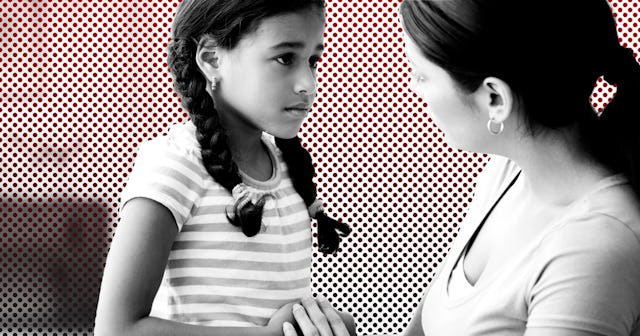Don't Just Tell Your Kids You're 'Fine' -- It's Okay To Let Them See Your Stress

A few weeks ago I wrote on my Facebook page that we shouldn’t be calling it homeschool, we should be calling it yell-school. Stress is high right now, and trying to homeschool our children while living through a pandemic isn’t exactly easy on the blood pressure. Unsurprisingly, some pearl-clutcher popped into the comments letting me know that I shouldn’t be yelling, and that I need to hide all the stress from my children.
As it turns out, a recent study reveals that hiding stress from your children is actually the last thing you want to do, so take that pearl-clutching commenter! Stressed out parents of the world unite!
But seriously, we’ve all heard the phrase “not in front of the kids,” right? Some researchers at Washington State University wanted to put that old axiom to the test. The study was conducted on 109 parents with their children in San Francisco, the sample split almost evenly between mothers and fathers. First, the researchers gave the parent a stressful task: public speaking with negative feedback provided by the audience. Then, the parents were given a LEGO activity to complete with their children, with some randomly told to suppress their emotions, and the others told to act naturally.
They hooked everyone up to sensors and had other scientists secretly observing everyone’s reactions. According to Sara Waters, an assistant professor in the Department of Human Development at WSU, “The act of trying to suppress their stress made parents less positive partners during the LEGO task. They offered less guidance, but it wasn’t just the parents who responded. Those kids were less responsive and positive to their parents. It’s almost like the parents were transmitting those emotions.”
So what does this all add up to? It means that your kids pick up on your stress, and are smart enough to know when you are hiding how you really feel. We can all look back on our childhood to a time when something bad happened — a death in the family, a parent lost a job, an eminent divorce — and you knew something was up, but the news hadn’t been broken yet, so you just sat and looked at your parents feeling that swampy discomfort that only comes when you know they’re trying to keep something from you. Turns out, we do the same thing to our kids right now, and the kids can tell… so you might as well come clean.
In fact, this is exactly what these researchers suggest. This is not to say that we should start treating our children as personal, in-house therapists, but we should be willing to let them know we are feeling stressed. Waters said there are dozens of studies that show kids are good at picking up “emotional residue” from their parents.
Danielle MacInnes/Unsplash
“Kids are good at picking up subtle cues from emotions,” she said. “If they feel something negative has happened, and the parents are acting normal and not addressing it, that’s confusing for them. Those are two conflicting messages being sent.” Rather than suppressing emotions in front of your children, Waters suggests the best course of action is to let kids see a healthy conflict, from start to resolution.
I know, I laughed at the term “healthy conflict,” too. Because conflict almost never feels healthy. But there are healthy ways to talk to your children about stress. Practically speaking, as we are all parenting in the age of coronavirus, our lives are packed with stress. After all, we are juggling home schooling, work (or the lack of it) and the new realities of social distancing and isolation while trying to keep our families safe. That sentence alone is enough to make your head spin, let alone your children’s.
Naturally, this brings me back to my joke about yell-school, because as it turns out, I probably am handling all this COVID-19 stress terribly. Dr. Jenny Radesky, a developmental behavioral pediatrician who teaches at the University of Michigan, told CBS-Sacramento, “These are fascinating findings about the way our bodies’ physiology links up with our children’s — for good or bad. [They] suggest that stifling emotions don’t get rid of them — they stay under our skin in the form of changes in our heart and nervous system functioning. And as most parents know, they can pop out later in the form of irritability, overreacting to our children or yelling.”
I think the above statement perfectly describes how I have been handling things.
We need to give ourselves grace, and hiding our stress is only making things worse for ourselves, and our children. The best thing to do is be open with our children about our stresses. Tell them how we are feeling — in age-appropriate ways, of course. They will get it. And it’s better than being cryptic about what’s bothering you, because that may lead them to jump to an overblown conclusion, causing more anxiety in the process.
“Honor your feelings and your child’s feelings,” Waters concludes. “Kids will work their way through it; they’re good at it. Giving yourself permission to feel opens up your mind to more and better problem solving. It’s a good thing.”
Ultimately, we are setting an example for our children in every way imaginable, and modeling how to discuss stress in an open, honest, and above all, healthy way, teaches our children how to cope with those sorts of emotions later in life. Being honest about our stress lets them see that to struggle is inevitable (and human), and that working through it is possible.
With all the upheaval we’re experiencing right now, it might be the best time ever to start modeling how to work through it. Because the stress may be temporary, but we’re setting our kids up with coping skills that will last them a lifetime.
This article was originally published on